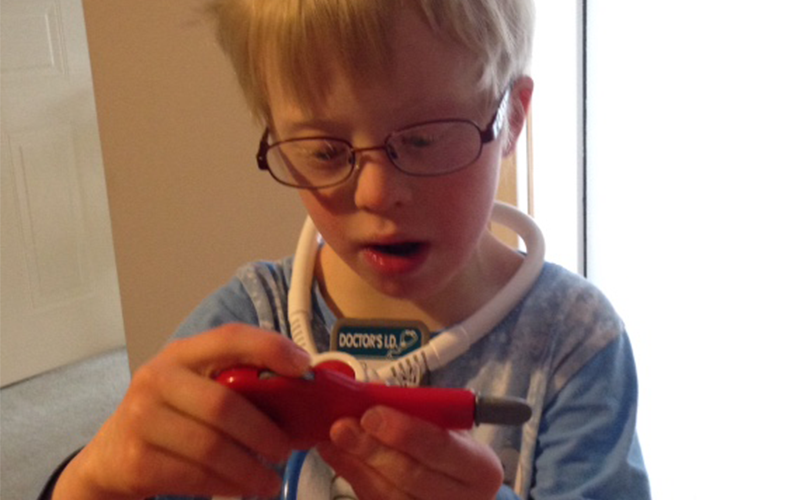Throughout her life my mother has been a Carer.
She first took on this role in her early teens when she cared for her stepfather who was terminally ill, while her mother went out to work to put food on the table (the NHS and the welfare state had barely got started at the time).
After raising me, she cared for her own mother, then her mother-in-law, and then her father-in-law in succession.
Now she cares for my stepfather who had a stroke some three years ago.
When I fell pregnant with my third child, and discovered the chances that the baby would have Down ’s syndrome were one-in-twelve, she was devastated.
The one thing she didn’t want for me was the life of a Carer.
After I refused an amino she didn’t speak to me for six weeks, so adamant was she that my life would not be worth living if I had a child with Down’s.
She thought it the height of self-destructive folly to continue blindly, in the hope that it was just a false alarm and everything would turn out all right.
Everything is all right.
Yes, it’s true that my son Freddie does have Down’s Syndrome, but – and this is a secret, so don’t tell anyone else on here or they’ll think I’m a big fraud when I write about disability issues – the truth is; I’m not a Carer.
That may not be true for everyone who has a child with DS, but it is true for me, and I’d bet you a pound to a penny that it’s true for some other families as well.
You see, Freddie is healthy and able-bodied, he just has a developmental delay and some learning and communication difficulties.
‘Extreme Parenting’, more accurately describes what I have to do for Freddie.
Each stage of development has come later and lasted longer, but he consistently progresses in the right direction.
I had a ‘baby’ for three years, and a ‘toddler’ for four.
Yes, we changed nappies for six years, but many children have the odd accident up to this age.
Now, at seven and a half, Freddie is reliably clean and dry in the day; at this stage we just have to remind him to go to the toilet every so often (there are so many, much more interesting things to do), and administer a few spoonfuls of medicine to keep on top of his tendency to constipation.
He wears a pull-up at night, because (lucky us) he sleeps right through, but some mornings he is dry when he wakes, so it looks likely we’ll get there in the end. Around one-in-four typical children wet the bed up to the age of about ten, anyway.
Yes, I spent a sleepless night on sick-bed duty last Saturday, administering medication and making warm drinks..
not for Freddie – who snored softly under his quilt the whole time – but for his dad, who had a nasty flare-up in his asthma.
I stayed alert the rest of the night, ears pricked for the sound of a deterioration in his breathing – severe asthma can rob you of the power of speech just when you most need to ask for help.
Many times when my daughter was small I lay beside her in bed, listening for the same, waking her every couple of hours, on doctor’s orders, to give her a dose of her inhaler.
I would much rather wipe a loved one’s bum from time to time than listen to them wheezing and gasping with such difficulty that I’m afraid they might stop breathing in front of me.
Yes, I have to deal with some challenging behaviour.
Partly this is due to developmental delay – patience helps a great deal here, remembering that Freddie is in some ways cognitively and emotionally younger than his chronological age.
Partly it’s due to frustration caused by learning, and especially communication, difficulties, in which case strategies like the use of Makaton have helped.
Partly, I have to say, it’s also due to personality.
My mother found me a very challenging child; luckily there’s no prenatal test for Outright-Awkward-Sod Syndrome, otherwise I might not be here.
Freddie has no major physical or mobility problems, so we don’t use any special equipment.
The only medication he is on is a mild laxative, which he slurps off a spoon.
So, in addition to only having to do a bit of, ‘Extreme Parenting’, I also still get to experience the milestones and the fun things that all mums and dads look forward to: hearing him read aloud, seeing him learn to write, to swim, and to ride a bike.
We go out to restaurants, the theatre, the zoo, and to museums.
We go on holiday. He kicks his football over the fence into the neighbour’s garden.
This is the truth of Down’s Syndrome for me.
You see, my mother’s fears were groundless.
You can’t blame her, such were the negative messages she’d absorbed about the condition, messages she tried to pass on to me.
How many others, hearing the, ‘received wisdom’, about Down’s, have been made to feel unequal to raising such a child, even though they wanted children?
